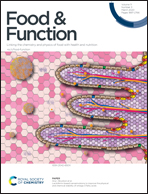
https://www.ncbi.nlm.nih.gov/pubmed/32329481
https://pubs.rsc.org/en/content/articlelanding/2020/FO/D0FO00066C#!divAbstract


https://www.ncbi.nlm.nih.gov/pubmed/32329481
https://pubs.rsc.org/en/content/articlelanding/2020/FO/D0FO00066C#!divAbstract

Cannabidiol (CBD), a commercially available, non-neurotropic marijuana constituent, has shown promise in arthritic animal models by attenuating pro-inflammatory immune responses. Additional research has demonstrated the benefit of CBD in decreasing the endogenous pain response in mice subjected to acute arthritic conditions, and further studies have highlighted improved fracture healing following CBD use in murine mid-femoral fractures.
However, there is a lack of high-quality, novel research investigating the use of CBD in human musculoskeletal diseases aside from anecdotal accounts and retrospective reviews, perhaps due to legal ramifications limiting the enrollment of patients. The purpose of this review article is to highlight the extent of current research on CBD and its biochemical and pharmacologic efficacy in the treatment of joint disease, as well as the evidence for use of CBD and cannabis in patients undergoing joint arthroplasty.
Based on available literature relying on retrospective data and case reports, it is challenging to propose a recommendation for CBD use in perioperative pain management. Additionally, a number of CBD products currently available as supplements with different methods of administration, and it is important to remember that these products are non-pharmaceuticals. However, given the increased social relevance of CBD and cannabis-based medicines, future, prospective controlled studies evaluating their efficacy are needed.”
 “The societal burden of ischemic stroke suggests a need for additional therapeutic categories in stroke prevention.
“The societal burden of ischemic stroke suggests a need for additional therapeutic categories in stroke prevention.
Modulation of the endocannabinoid system (ECS) is a rational target for stroke prevention because of its effects on inflammation, vascular tone, and metabolic balance, all well-described stroke risk factors.
In this article, we summarize the existing ECS clinical studies in human subjects’ research as they relate to conventional vascular risk factors associated with ischemic stroke.”
https://www.ncbi.nlm.nih.gov/pubmed/32322672
https://www.liebertpub.com/doi/10.1089/can.2018.0066

 “Endocannabinoid system activity contributes to the homeostatic defense against aging and thus may counteract the progression of brain aging.
“Endocannabinoid system activity contributes to the homeostatic defense against aging and thus may counteract the progression of brain aging.
The cannabinoid type 1 (CB1) receptor activity declines with aging in the brain, which impairs neuronal network integrity and cognitive functions.
Altogether, these findings suggest that reduced CB1 signaling in CB1-KO mice leads to reduced mitophagy and abnormal mitochondrial morphology in hippocampal neurons during aging.
These mitochondrial changes might be due to the impairments in mitochondrial quality control system, which links age-related decline in CB1 activity and impaired memory.”
https://www.ncbi.nlm.nih.gov/pubmed/32294520
https://www.sciencedirect.com/science/article/abs/pii/S0361923020301386?via%3Dihub
“Toll-like receptors (TLRs) are sensors of pathogen-associated molecules that trigger inflammatory signalling in innate immune cells including macrophages. All TLRs, with the exception of TLR3, promote intracellular signalling via recruitment of the myeloid differentiation factor 88 (MyD88) adaptor, while TLR3 signals via Toll-Interleukin-1 Receptor (TIR)-domain-containing adaptor-inducing interferon (IFN)-β (TRIF) adaptor to induce MyD88-independent signalling. Furthermore, TLR4 can activate both MyD88-dependent and -independent signalling (via TRIF).
The study aim was to decipher the impact of the highly purified plant-derived (phyto) cannabinoids Δ9-tetrahydrocannabinol (THC) and cannabidiol (CBD), when delivered in isolation and in combination (1:1), on MyD88-dependent and -independent signalling in macrophages.
TLRs are attractive therapeutic targets given their role in inflammation and initiation of adaptive immunity, and data herein indicate that both CBD and THC preferentially modulate TLR3 and TLR4 signalling via MyD88-independent mechanisms in macrophages. This offers mechanistic insight into the role of phytocannabinoids in modulating cellular inflammation.”
https://www.ncbi.nlm.nih.gov/pubmed/32244040
https://www.jni-journal.com/article/S0165-5728(20)30057-6/pdf
“Cannabinoids have been shown to exert anti-inflammatory activities in various in vivo and in vitro experimental models as well as ameliorate various inflammatory degenerative diseases. Δ9-Tetrahydrocannabinol (THC) is a major constituent of Cannabis. The second major constituent of Cannabis extract is cannabidiol (CBD). Both THC and CBD have been shown to exert anti-inflammatory properties and to modulate the function of immune cells. In summary, our results show that although both THC and CBD exert anti-inflammatory effects, the two compounds engage different, although to some extent overlapping, intracellular pathways. Both THC and CBD decrease the activation of proinflammatory signaling.” https://www.ncbi.nlm.nih.gov/pmc/articles/PMC2804319/
 “Cannabidiol (CBD) has been used to treat a variety of cancers and inflammatory conditions with controversial results. In previous work, we have shown that breast cancer MCF-7 cells, selected by their response to inflammatory IL-1β cytokine, acquire a malignant phenotype (6D cells) through an epithelial-mesenchymal transition (EMT).
“Cannabidiol (CBD) has been used to treat a variety of cancers and inflammatory conditions with controversial results. In previous work, we have shown that breast cancer MCF-7 cells, selected by their response to inflammatory IL-1β cytokine, acquire a malignant phenotype (6D cells) through an epithelial-mesenchymal transition (EMT).
We evaluated CBD as a potential inhibitor of this transition and inducer of reversion to a non-invasive phenotype. It decreased 6D cell viability, downregulating expression of receptor CB1. The CBD blocked migration and progression of the IL-1β-induced signaling pathway IL-1β/IL-1RI/β-catenin, the driver of EMT.
Cannabidiol reestablished the epithelial organization lost by dispersion of the cells and re-localized E-cadherin and β-catenin at the adherens junctions. It also prevented β-catenin nuclear translocation and decreased over-expression of genes for ∆Np63α, BIRC3, and ID1 proteins, induced by IL-1β for acquisition of malignant features.
Cannabidiol inhibited the protein kinase B (AKT) activation, a crucial effector in the IL-1β/IL-1RI/β-catenin pathway, indicating that at this point there is crosstalk between IL-1β and CBD signaling which results in phenotype reversion.
Our 6D cell system allowed step-by-step analysis of the phenotype transition and better understanding of mechanisms by which CBD blocks and reverts the effects of inflammatory IL-1β in the EMT.”
 “Neuroinflammation in the rostral ventrolateral medulla (RVLM) has been reported to be associated with hypertension. The upregulation and activation of the cannabinoid type 2 (CB2) receptor may be part of the active process of limiting or downregulating the inflammatory process.
“Neuroinflammation in the rostral ventrolateral medulla (RVLM) has been reported to be associated with hypertension. The upregulation and activation of the cannabinoid type 2 (CB2) receptor may be part of the active process of limiting or downregulating the inflammatory process.
This study was designed to determine the role of the CB2 receptor in blood pressure (BP) through relieving neuroinflammation in the RVLM in spontaneously hypertensive rats (SHRs).
Taken together, our results suggest that exciting the CB2 receptor relieves proinflammatory cytokine levels in the RVLM to decrease the BP, HR and RSNA in SHRs.”
 “Cannabis has been used for thousands of years in many cultures for the treatment of several ailments including pain.
“Cannabis has been used for thousands of years in many cultures for the treatment of several ailments including pain.
The benefits of cannabis are mediated largely by cannabinoids, the most prominent of which are tetrahydrocannabinol (THC) and cannabidiol (CBD). As such, THC and/or CBD have been investigated in clinical studies for the treatment of many conditions including neuropathic pain and acute or chronic inflammation.
While a plethora of studies have examined the biochemical effects of purified THC and/or CBD, only a few have focused on the effects of full-spectrum cannabis plant extract. Accordingly, studies using purified THC or CBD may not accurately reflect the potential health benefits of full-spectrum cannabis extracts.
Indeed, the cannabis plant produces a wide range of cannabinoids, terpenes, flavonoids, and other bioactive molecules which are likely to contribute to the different biological effects. The presence of all these bioactive molecules in cannabis extracts has garnered much attention of late especially with regard to their potential role in the treatment of neuropathic pain associated with multiple sclerosis.:
Herein, the current knowledge about the potential beneficial effects of existing products of full-spectrum cannabis extract in clinical studies involving patients with multiple sclerosis is extensively reviewed. In addition, the possible adverse effects associated with cannabis use is discussed along with how the method of extraction and the delivery mechanisms of different cannabis extracts contribute to the pharmacokinetic and biological effects of full-spectrum cannabis extracts.”
https://www.ncbi.nlm.nih.gov/pubmed/32239248
https://link.springer.com/article/10.1007%2Fs00011-020-01341-1
 “Medicinal use of Cannabis sativa L. has an extensive history and it was essential in the discovery of phytocannabinoids, including the Cannabis major psychoactive compound-Δ9-tetrahydrocannabinol (Δ9-THC)-as well as the G-protein-coupled cannabinoid receptors (CBR), named cannabinoid receptor type-1 (CB1R) and cannabinoid receptor type-2 (CB2R), both part of the now known endocannabinoid system (ECS).
“Medicinal use of Cannabis sativa L. has an extensive history and it was essential in the discovery of phytocannabinoids, including the Cannabis major psychoactive compound-Δ9-tetrahydrocannabinol (Δ9-THC)-as well as the G-protein-coupled cannabinoid receptors (CBR), named cannabinoid receptor type-1 (CB1R) and cannabinoid receptor type-2 (CB2R), both part of the now known endocannabinoid system (ECS).
Cannabinoids is a vast term that defines several compounds that have been characterized in three categories: (i) endogenous, (ii) synthetic, and (iii) phytocannabinoids, and are able to modulate the CBR and ECS. Particularly, phytocannabinoids are natural terpenoids or phenolic compounds derived from Cannabis sativa.
However, these terpenoids and phenolic compounds can also be derived from other plants (non-cannabinoids) and still induce cannabinoid-like properties. Cannabimimetic ligands, beyond the Cannabis plant, can act as CBR agonists or antagonists, or ECS enzyme inhibitors, besides being able of playing a role in immune-mediated inflammatory and infectious diseases, neuroinflammatory, neurological, and neurodegenerative diseases, as well as in cancer, and autoimmunity by itself.
In this review, we summarize and critically highlight past, present, and future progress on the understanding of the role of cannabinoid-like molecules, mainly terpenes, as prospective therapeutics for different pathological conditions.”